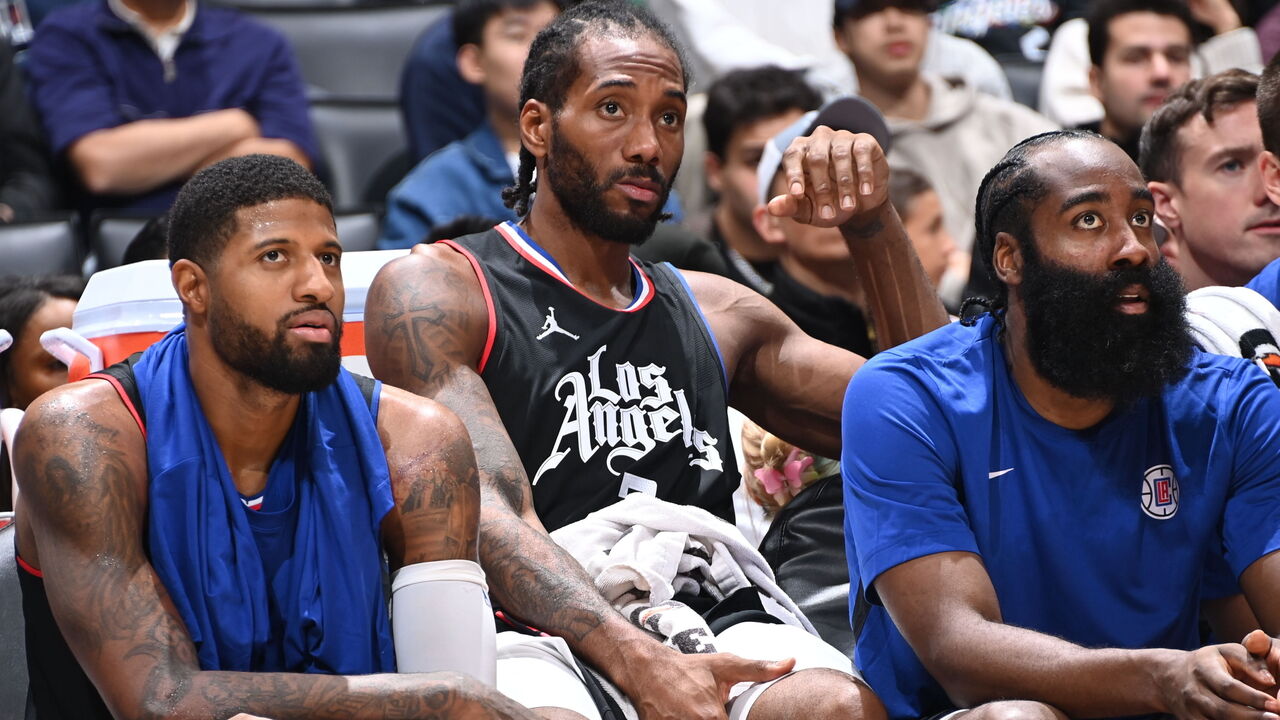Can we ever trust Kawhi's knee or the Clippers again?
Ah, those familiar reminders that NBA basketball is just around the corner: autumn winds, leaves changing color, a Kawhi Leonard injury.
To be clear, Leonard's health is no joke. We all want to see the two-time Finals MVP back on the court with the Los Angeles Clippers, preferably for more than just a few weeks or months at a time. But as Leonard enters his age-33 season, with lingering inflammation in his surgically repaired right knee - which has withstood an ACL tear and multiple meniscus injuries - durability appears a pipe dream.
There doesn't have to be a scapegoat, but Clippers fans can be forgiven for feeling misled by the many twists and turns in this saga. If Leonard or a Clippers official tells you the six-time All-Star is feeling great or progressing well, you can rest assured that the "out indefinitely" press release is just around the corner.
When Leonard was sent home from Team USA's July training camp in Las Vegas after three days of practice, Clippers president Lawrence Frank insinuated the national team was being unfair to Leonard. By Frank's estimation, Leonard looked "very good" in camp and should've been given a longer runway to prove he could be ready for the Olympics later that month. Yet three months later, Leonard's troublesome right knee has prevented him from taking part in any contact-related preseason work, and he'll begin the regular season on the shelf.
Either Frank and the Clippers were misled by Leonard's camp, the Clippers are purposely misleading everyone else, or Leonard's knee is simply too unpredictable to ever bank on again. Either way, it underscores just how badly the team bungled the last nine months.

Last season marked seven years since Leonard had played more than 60 games in a season, yet a half-season of improved health was all the Clippers needed to see before handing him a three-year extension worth $149.5 million in January.
A 39-game stretch from November through January in which the Clippers were 31-8 was seemingly enough to convince the front office that a creaky core of Leonard, Paul George, and James Harden was a championship-level trio to invest in. Yet a disappointing second half and another Leonard injury led the same front office to get cold feet just a few months later.
The Clippers balked at giving George a fourth year on a new contract when Leonard had settled for three, citing roster flexibility and the constraints of the league's new second salary-cap apron. Never mind that the team still would've had to grapple with those constraints if George had accepted their three-year offer and that they could've maneuvered their way under the apron later.
With Leonard already locked up and plans to re-sign Harden (which the Clippers did on a two-year deal), L.A. was still clearly trying to compete for the franchise's first title when negotiating with George, whom they knew they wouldn't be able to replace on the open market.
Without control of their own first-round draft pick until 2030 - the price of a justifiable 2019 bet on George (and Leonard) that saw the team trade eventual MVP runner-up Shai Gilgeous-Alexander and control of seven picks - the Clippers were also painfully aware that there was no potential benefit to taking a step back in the standings.
Yet we're supposed to believe they genuinely thought letting George walk and replacing him with role players was an acceptable result? The Clippers overplayed their hand by assuming George wouldn't receive a four-year max offer, despite all the signs pointing to Philadelphia.
In a bizarre statement released following George's departure, the Clippers cited Leonard's All-NBA abilities as a reason the franchise still felt confident it would field "a highly competitive team this season and moving forward." That statement was written just three months after a right knee injury had forced Leonard to miss playoff games for the fourth straight postseason.
Given how things played out with George, the Clippers would've been better off trading their stars last season to begin recouping draft capital and real flexibility, the way the Brooklyn Nets once did when they realized their superteam dreams were dead. Instead, an unending faith in Leonard's failing body led the Clippers down a path where the only option left appears to be lying to themselves (and their fans) about his health and future.
Whether they're being misled or misleading us, Los Angeles' last nine months are a good reminder of what the franchise's entire existence should've taught us by now: Never trust the Clippers.
Joseph Casciaro is theScore's lead Raptors and NBA reporter.
HEADLINES
- Butler on trade rumors: 'Sooner or later, the whole truth will come out'
- Why Butler won't get his way in standoff with Pat Riley, Heat
- Knicks' quietly improved defense makes them look like contenders
- Big board: Top 25 players who could be dealt at the NBA trade deadline
- Without Morant, Grizzlies hand Spurs their largest loss of season